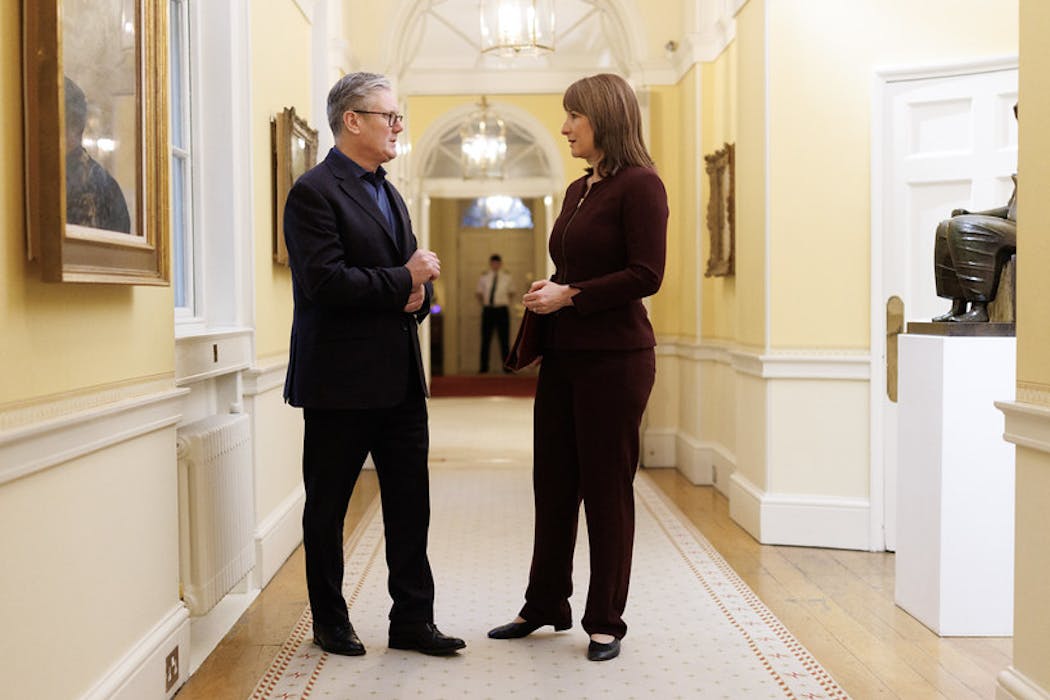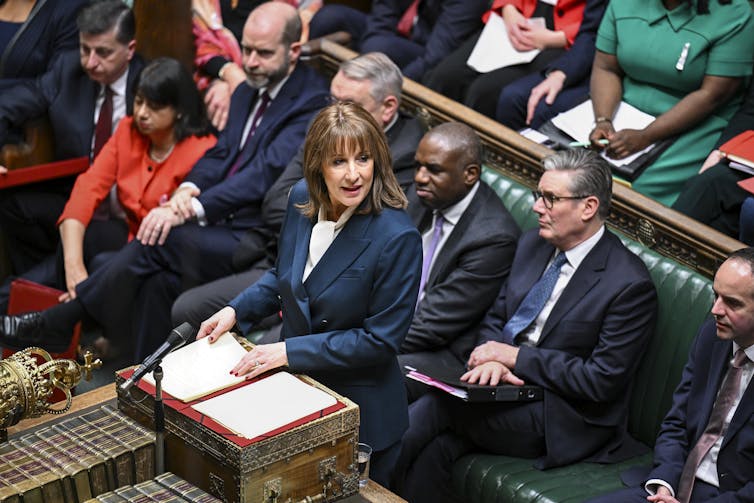
Rachel Reeves’s budget was seen as a “make or break” moment for the chancellor and the government, which is suffering from low approval ratings and rapidly fading public confidence. At the same time, threats of a leadership challenge and the impending May elections mean Keir Starmer has a tricky path to navigate.
Can this budget save the chancellor and the prime minister’s careers? Here’s what our panel of politics experts has to say.
Breathing room before tough May elections
Thomas Caygill, Senior Lecturer in Politics, Nottingham Trent University
The two main audiences for this budget were backbench Labour MPs and the financial markets. The morning after, both appeared broadly content. This gives Starmer and Reeves some short-term breathing space.
But local elections in England and Scottish and Welsh parliamentary elections in May mean this won’t last long. The current polling for Labour is not pretty, particularly in Wales. This is where the longer-term impact of the budget will be key.
The scrapping of the two-child benefit cap is popular with Labour MPs and will be popular with Labour members and their core voters. However, across the electorate overall, retaining the cap was popular.
Reeves announced a £150 cut to fuel bills, which will give Labour something to campaign on, along with a financial boost to both the Scottish (£820 million) and Welsh (£505 million) governments, and the freeze in rail fares. But some of these measures will not come into effect until April. This means that voters will not really have felt the benefit of them by the time they go to the polls.
It remains to be seen whether these measures can improve the party’s fortunes in time for May’s election and save the prime minister and chancellor beyond next summer (another key moment of danger, if May’s election results are as bad as feared).
Delaying the pain may not lead to political gain
Paula Keaveney, Associate Tutor in Politics, Edge Hill University
If you see Reeves’s continued freeze in tax thresholds as a tax increase (which effectively it is), this was a manifesto-breaking, and later-made promise-breaking budget. While most normal people don’t read manifestos, this is ammunition for opponents, whether they sit opposite Reeves and Starmer or behind them.
In timing terms, Reeves may be lucky. The budget measures don’t all take effect on the same day. In fact, some don’t kick in for years. So, there is no big bang of dissatisfaction. Other political rows will take over the column inches. And there are pieces of good news that the government spin machine will have on repeat, like train fares being frozen and minimum wages going up.
Read more: What the budget could mean for you – experts react to the chancellor's announcement
By delaying some of the pain, Reeves appears to have broken one of the cardinal rules of the electoral cycle in parliamentary politics: get the bad stuff done as early as you can. Markets may not have to answer to voters, but MPs do. And angry voters have the power to spook MPs.
The next mass spooking opportunity comes with the May elections. As some of the pain from the budget won’t come until after then, we won’t see solid cause and effect. But the “send a message” technique – where parties urge voters to send a message to the government of the day (mainly by voting for someone else) in contests outside of general elections – is tried and tested, whether on big issues or changes affecting small parts of our daily lives.
The public will often sagely agree that tough, sensible decisions are needed. It is hard to see anyone responding to what’s known about the current financial situation with, “Let’s spend recklessly.” But that is all very well when it is hypothetical. We all know when we feel less secure or worse off, and voters tend to react against that.
Stability now, spending later
Despina Alexiadou, Reader at the School of Government and Public Policy, University of Strathclyde
The budget delivered by Rachel Reeves prioritises income redistribution over business incentives and macroeconomic stability over ambitious public investments.
But it fails in two central promises made during the election: first, to not raise income tax, and second (I think even more importantly) to kickstart the economy through large public investment in ambitious projects, such as the now seemingly abandoned green prosperity plan to invest billions in transitioning the economy to net zero. UK public investment lags behind most OECD countries and the new budget does not address this.
The government cannot achieve its goals for economic growth unless it survives. And being still early in the legislative cycle, Reeves had to prioritise the government’s popularity in parliament rather than in the polls.

Democratically-elected governments time policies to stabilise themselves early in the electoral cycle, hoping to deliver a stronger economy closer to the elections.
If Reeves’s plans work out, she will be able to moderately grow the economy through economic stability and the improvement of public services. If the government brings public debt down, she might be able to cut taxes during the next election, though this is probably too optimistic as many of the new tax rises do not kick-in until 2029, (an election year).
This budget has saved the government for now and should mute backbenchers’ demands. But for her to deliver a more ambitious budget next year, she will have to grow the economy, against the meagre projections.
Read more: What will the budget mean for economic growth? Experts give their view
The government still needs a narrative
Alex Prior, Lecturer in Politics with International Relations, London South Bank University
Even before the budget was delivered, there was an impending sense of doom. At best, it was seen as a “last chance” for the chancellor. At worst, there was an assumption of it already being over for Labour before it had begun. One Labour MP told the BBC that they were “on a four-year walk to the guillotine”.
If the narrative of doom has set in, it’s because Starmer and Reeves haven’t supplied a more convincing one. The Office for Budget Responsibility’s leak of its budget analysis ahead of Reeves’s speech also meant that the information was in the public domain before the chancellor could “set the scene”.
The budget itself did little to salve the feeling that this Labour government is sorely lacked a uniting narrative – a reason why we should all get behind higher taxes to rescue our stagnating public services.
Times columnist Daniel Finkelstein argues that “so powerful is a feeling of purpose that support for difficult decisions can even go up the harder people are being hit” because of “our ability to rationalise the sacrifices we make”.
Similarly, economist Jo Michell concludes: “With a clear understanding of the destination, Labour could articulate a narrative that balances pain … with gain, by explaining how peoples’ lives will improve.”
Budgets can work when leaders convey purpose, and rationalise sacrifices in a narrative that people believe and feel part of. If Starmer and Reeves want saving, their narrative and destination need to be made clear, for themselves and for citizens.
They might regret not taking more risks
Colm Murphy, Senior Lecturer in British Politics, Queen Mary University of London
This was a survival budget, not a salvation budget.
In a sulphurous political atmosphere, Reeves needed to satisfy three audiences: mutinous Labour MPs, markets and target voters. This explains, respectively, the abolition of the two-child benefit cap, the £26 billion of tax rises (largely through threshold freezes), and the choice of symbolic taxes on the wealthy and energy bill reductions.
The political narrative accompanying each decision could unravel. Lifting the two-child cap will give over half a million families an extra £5,000 a year on average. But Labour MPs might baulk at implied later cuts, for example to special needs provision.
Markets reacted positively, but the fiscal consolidation is backdated to the end of forecast. If there is another shock, the headroom could vanish.
The government’s political opponents will claim that, through freezing tax thresholds, it has effectively killed its manifesto pledge not to tax “working people” through a back-alley assassination.
Reeves and Starmer swerved the alternative of a righteous public execution: breaking the letter of their pledge by openly raising tax rates to enable a fast delivery of “change” in public services. This is therefore a defensive budget, and their caution is understandable.
But if global and domestic conditions do not improve, it may be remembered as a missed opportunity to take a greater political risk – with bigger potential costs, but also rewards.
Thomas Caygill has previously received funding from the British Academy/Leverhulme Trust and the Economic and Social Research Council.
Alex Prior, Colm Murphy, Despina Alexiadou, and Paula Keaveney do not work for, consult, own shares in or receive funding from any company or organisation that would benefit from this article, and have disclosed no relevant affiliations beyond their academic appointment.
This article was originally published on The Conversation. Read the original article.







